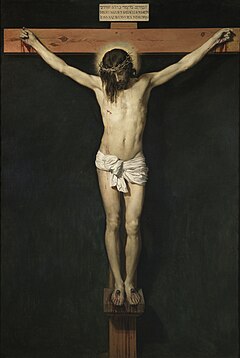
Back Goeie Vrydag Afrikaans Karfreitag ALS Viernes Santo AN الجمعة العظيمة Arabic ܥܪܘܒܬܐ ܕܚܫܐ ARC الجمعه العظيمه ARZ গুড ফ্ৰাইডে Assamese Biyernes Santo BCL Вялікая пятніца Byelorussian Разпети петък Bulgarian
| Good Friday | |
|---|---|
 A depiction of Jesus's crucifixion by Diego Velázquez, named "Christ Crucified", 1632 | |
| Type | Christian |
| Significance | Commemoration of the crucifixion and the death of Jesus Christ |
| Celebrations | Celebration of the Passion of the Lord |
| Observances | Worship services, prayer and vigil services, fasting, almsgiving |
| Date | The Friday immediately preceding Easter Sunday |
| 2023 date |
|
| 2024 date |
|
| 2025 date |
|
| 2026 date |
|
| Related to | Passover, Christmas (which celebrates the birth of Jesus), Septuagesima, Quinquagesima, Shrove Tuesday, Ash Wednesday, Lent, Palm Sunday, Holy Wednesday, Maundy Thursday, and Holy Saturday which lead up to Easter, Easter Sunday (primarily), Divine Mercy Sunday, Ascension, Pentecost, Whit Monday, Trinity Sunday, Corpus Christi and Feast of the Sacred Heart which follow it. It is related to the Feast of the Exaltation of the Holy Cross, which focuses on the benefits, graces, and merits of the Cross, rather than Jesus Christ's death. |
Good Friday is a Christian holy day observing the crucifixion of Jesus and his death at Calvary. It is observed during Holy Week as part of the Paschal Triduum. It is also known as Black Friday, Holy Friday, Great Friday, Good Friday of the Passion of the Lord, Great and Holy Friday (also Holy and Great Friday).[1][2]
Members of many Christian denominations, including the Catholic, Eastern Orthodox, Lutheran, Anglican, Methodist, Oriental Orthodox, United Protestant and some Reformed traditions (including certain Continental Reformed, Presbyterian and Congregationalist churches), observe Good Friday with fasting and church services.[3][4][5] In many Catholic, Lutheran, Anglican and Methodist churches, the Service of the Great Three Hours' Agony is held from noon until 3 p.m.—the hours the Bible records darkness covering the land until Jesus' death on the cross.[6] Communicants of the Moravian Church have a Good Friday tradition of cleaning gravestones in Moravian cemeteries.[7]
The date of Good Friday varies from one year to the next in both the Gregorian and Julian calendars. Eastern and Western Christianity disagree over the computation of the date of Easter and therefore of Good Friday. Good Friday is a widely instituted legal holiday around the world, including in most Western countries and 12 U.S. states.[8] Some predominantly Christian countries, such as Germany, have laws prohibiting certain acts—public dancing, horse racing—in remembrance of the somber nature of Good Friday.[9][10]
- ^ Franklin M. Segler; Randall Bradley (2006). Christian Worship: Its Theology And Practice. B&H Publishing Group. p. 226. ISBN 978-0-8054-4067-6. Archived from the original on 3 October 2021. Retrieved 13 April 2012.
- ^ Gilman, Daniel Coit; Peck, Harry Thurston; Colby, Frank Moore (1903). The New International Encyclopaedia. Dodd, Mead and Company. p. 77.
Good Friday is also known as Black Friday in the Western Church , because on that day clerical vestments and altar draperies are black .
- ^ Ripley, George; Dana, Charles Anderson (1883). The American Cyclopaedia: A Popular Dictionary for General Knowledge. D. Appleton and Company. p. 101.
The Protestant Episcopal, Lutheran, and Reformed churches, as well as many Methodists, observe the day by fasting and special services.
- ^ Cite error: The named reference
Pfatteicher1990was invoked but never defined (see the help page). - ^ Cite error: The named reference
JacobsHaas1899was invoked but never defined (see the help page). - ^ "What is the significance of Good Friday?". The Free Press Journal. 2 April 2021. Archived from the original on 3 October 2021. Retrieved 3 April 2021.
- ^ Cite error: The named reference
WSJ2020was invoked but never defined (see the help page). - ^ Harper's New Monthly Magazine, Volume 36, Issue 214. Harper & Brothers. 1868. p. 521.
In England Good-Friday and Christmas are the only close holidays of the year when the shops are all closed and the churches opened.
- ^ Cite error: The named reference
Petrewas invoked but never defined (see the help page). - ^ Cite error: The named reference
Stevenswas invoked but never defined (see the help page).
© MMXXIII Rich X Search. We shall prevail. All rights reserved. Rich X Search